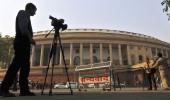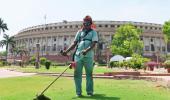Days ahead of the budget session of Parliament, the Rajya Sabha Secretariat has released a code of conduct for its members.

The direction for the 'code of conduct' came from chairman of the Upper House M Venkaiah Naidu, informing that "Committee on ethics in its fourth report presented to the council on the March 14, 2005 and adopted by it on April 20, 2005 had inter alia considered the code of conduct for members enumerated by the committee in its first report which was also adopted by the council. The committee felt that the code was quite comprehensive and endorsed the same. It recommended that the code of conduct may be published in bulletin part II on the eve of each session for information of and compliance by the members."
As per the statement, of the rules of procedure and the conduct of business lists that the members of Rajya Sabha should "acknowledge their responsibility to maintain the public trust reposed in them and should work diligently to discharge their mandate for the common good of the people."
It further states: "They must hold in high esteem the Constitution, the Law, Parliamentary Institutions and above all the general public. They should constantly strive to translate the ideals laid down in the Preamble to the Constitution into a reality. The following are the principles which they should abide by in their dealings."
As per the rules and regulations, members must not do anything that brings disrepute to the Parliament and affects their credibility, and members must utilise their position as Members of Parliament to advance general well-being of the people.
It also states that in their dealings if members find that there is a conflict between their personal interests and the public trust which they hold, they should resolve such a conflict in a manner that their private interests are subordinated to the duty of their public office.
Members should always see that their private financial interests and those of the members of their immediate family do not come in conflict with the public interest and if any such conflict ever arises, they should try to resolve such a conflict in a manner that the public interest is not jeopardised, the bulletin said.
It also stated that members should never expect or accept any fee, remuneration or benefit for a vote given or not given by them on the floor of the House, for introducing a Bill, for moving a resolution or desisting from moving a resolution, putting a question or abstaining from asking a question or participating in the deliberations of the House or a parliamentary committee.
"Members should not take a gift which may interfere with honest and impartial discharge of their official duties. They may, however, accept incidental gifts or inexpensive mementoes and customary hospitality. Members holding public offices should use public resources in such a manner as may lead to public good," said the statement.
If members are in possession of a confidential information owing to their being Members of Parliament or members of parliamentary committees, they should not disclose such information for advancing their personal interests, as per the rules, it said
Members should desist from giving certificates to individuals and institutions of which they have no personal knowledge and are not based on facts.
Members should not lend ready support to any cause of which they have no or little knowledge.
The 'code of conducts lists that members should not misuse the facilities and amenities made available to them, they should not be disrespectful to any religion and work for the promotion of secular values and they should keep uppermost in their mind the Fundamental Duties listed in Part IVA of the Constitution.
Members of the Upper House are expected to maintain high standards of morality, dignity, decency and values in public life.
The Rajya Sabha has been a ground of confrontation between the treasury benches and the Opposition both in the last winter session as well as the monsoon session of 2021.
Twelve opposition members of Rajya Sabha were suspended for the entire winter session by Chairman Naidu after a Motion was moved by the government.
These members allegedly tried to intimidate security personnel, cause physical harm to them and intimidate the chair on the last day of the monsoon session of Parliament.
The suspended MPs included Priyanka Chaturvedi and Anil Desai from the Shiv Sena, Dola Sen and Shanta Chettri from the Trinamool Congress, Elemaram Kareem and Binoy Vishwam from Left parties, Phulo Devi Netam, Ripun Bora, Rajamani Patel, Syed Nasir Hussain and Akhilesh Pratap Singh from the Congress.
A Motion was moved on the first day of the winter session by Parliamentary Affairs Minister Pralhad Joshi under Rule 256 of Raja Sabha Rules. On the last day of the winter session TMC leader Derek O'Brien was also suspended for the remaining part of the session.
The parliament session will begin amid electioneering for assembly elections to five states.
President Ram Nath Kovind will address the joint sitting of two Houses on January 31 and the Union Budget will be presented on February 1.
Rajya Sabha is likely to function from 10 am till 3 pm on working days while the Lok Sabha will function from 4 pm to 9 pm.
The first part of the Budget Session will begin on January 31 and will continue till February 11. The second part of the budget session will be held from March 14 to April 8.











 © 2025
© 2025